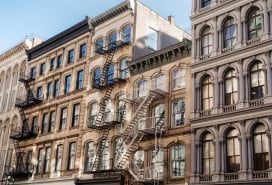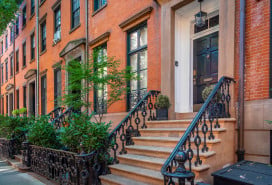Buyer beware: Learn from this HDFC co-op's mistakes

HDFC co-ops can seem too good to be true, offering affordably priced co-ops in desirable New York City neighborhoods. And, according to an article on DNA Info, sometimes they just might be, after all.
The site reports on one co-op in the HDFC program (HDFC stands for Housing Development Fund Corporation, in case you were wondering) on West 106th street that's currently involved in a lawsuit. Tenants claim the board has allegedly been collecting salaries from the debt-ridden building (which is illegal), filled the building with friends and relatives, used co-op funds to renovate apartments, and failed to maintain proper finance records.
The city’s HDFC program, created in the 1990s, turned neglected buildings into co-ops and let tenants run them. They are meant to be a way for low-income residents to become homeowners in the city. Income caps are usually under six figures for an individual, sometimes stretching to the mid-$100,000s for a couple or family. To get an idea of how much more reachable their prices can be compared to other similar listings, a one-bedroom in a central Harlem HDFC building is currently on the market for $235,000. The average price for one-bedroom co-ops sold in the area in the last 90 days was almost exactly $100,000 more—$334,517, per Streeteasy.
According to DNA Info, if the building on 106th Street "can't pay down its arrears, the city would transfer ownership to an affordable housing developer who would turn it back into rentals. Current shareholders could remain as renters but would lose all their equity."
In other words, it's pretty much a worst case scenario for anyone who's bought into an income-capped HDFC building.
One problem, says Dean Roberts, a real estate attorney at Norris McLaughlin & Marcus, is that the city's department of Housing Preservation and Development (known as the HPD) doesn't have the resources to oversee HDFC co-ops properly.
And even when they're not purposely breaking the rules, the boards are often unaware of some of the rules. Mismanagement and unpaid property taxes are not uncommon. "There's a lack of supervision and management," says Roberts, who has worked with buyers in HDFC co-ops. "A lot of these boards don't even know what the HPD is."
Roberts offers these tips if you're considering buying in an HDFC building:
1. Run a litigation check against the name of the co-op. You can do this for free on eCourts. "Whether the board is the defendant or the plaintiff, being involved in a lot of litigation — or major litigation — is a red flag," says Roberts.
2. See if they have board minutes, and check to see if anything fishy seems to be going on, or if there's been discussion about impending projects. This is a pretty standard procedure for prospective buyers, but the problem in HDFC co-ops, Roberts says, is that many don't keep minutes.
3. Check financials. Again, this is a standard step when buying a co-op, but in an HDFC, it can be tricky. Assuming the board has financial statements, you'll want to see how much money they have in reserve, whether they've had a somewhat recent maintenance increase (that reduces the likelihood that you're about to get hit with a huge one), and that they don't have a negative balance, says Roberts. "They should have some kind of financial records — even one paragraph."
How do you know it's legit? "You don't," he says. "You have to take a certain leap of faith."
Related:
Buy a co-op at a discount: All about HDFCS, and how to snag one
Hit the NYC jackpot: How to get an affordable Mitchell-Lama apartment
I'm coming up short on a downpayment. Will I ever be a homeowner?
http://www.brickunderground.com/blog/2014/05/buy_curious_keeping_monthly...

























